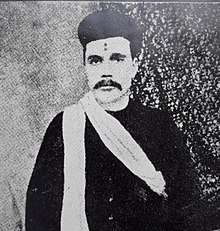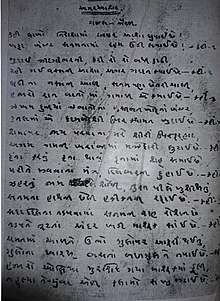Manilal Dwivedi
| Manilal Dwivedi | |
|---|---|
 | |
| Born |
Manilal Nabhubhai Dwivedi 26 September 1858 Nadiad, Bombay presidency, British India |
| Died |
10 October 1898 (aged 40) Nadiad, Bombay presidency, British India |
| Occupation | Poet, novelist, playwright, philosopher and editor |
| Language | Gujarati |
| Nationality | Indian |
| Education | B.A, M.A |
| Alma mater | Elphinstone College |
| Period | Pandit era |
| Notable works |
|
Manilal Nabhubhai Dwivedi (Gujarati: મણિલાલ નભુભાઇ દ્વિવેદી) (26 September 1858 – 10 October 1898) was a poet, novelist and essayist in Gujarati literature. He was a well-known philosopher as well. Acclaimed by Narmadashankar Dave as his intellectual heir, Manilal was one of the most influential thinker of 19th-century Gujarati literature, and was the first Gujarati graduate of the new Bombay University to come on the literary scene of Gujarati language. He elaborated Narmadashankar's line of thinking through his writings in his monthlies Priyamvada and Sudarshan from 1886 to his premature death, at the age of forty, in 1898.[1]
Life
Early life and family
Manilal was born in Sathodara Nagar family at Nadiad, Gujarat on 26 September 1858. His grandfather, Bhailal Dave, was a police sub-inspector. Manial's father, Nabhubhai who was a moneylender and temple priest, inherited the property of eleven thousand rupees and a house from his father. On the next day of Manilal's birth, a well-versed astrologer living near his home declared that the child would have a brilliant career.[2]
Manilal completed primary and secondary education in Nadiad. At the age of four, he joined primary school in Nadiad. He had strong dislike of doing sum and therefore he remained absence in arithmetic class. He showed good progress in the secondary school; he got first rank in the annual examination of the second standard and won a prize. Pleased with his good performance, the school teacher granted him promotion ahead to the fourth standard as a special case, but Manilal was not happy with this favour and requested to school teacher to declass him to the third standard. He was not good in Sanskrit and Geometry and therefor failed in Sanskrit in matriculation examination in 1875 but he was ranked second in examination in Bombay University the next year winning James Tylor prize.[2]
He joined Elphinstone College in 1877 and completed Bachelor of Arts in History and Politics in 1880. On insistence by his father to earn, he left studies but completed MA by studying himself. He returned to Nadiad and joined Government High School in July 1880 as an assistant teacher. In 1881, he was transferred to Bombay as a Deputy Education Inspector of girls schools. He joined Shamaldas College in Bhavnagar in 1885 but retired in 1889 following his ill health. He served as a head of Archeology department from 1893 to 1895 started by Baroda State. He died in 1898 in Nadiad.[3][4]
Works
He contributed in almost all popular forms of literature during his time. His published writing is comprising poems, plays, essays, adaptation of an English novel, book reviews, literary criticism, research, edited works, translations, compilation and an autobiography in manuscript form. He also wrote numerous articles on philosophic and literary subjects, which have been collected in Sudarshan Gadyavali (1909). He was an exponent of advaita philosophy. Throughout his life, he interpreted all aspects of human life and civilization in the context of Advaita Vedanta.[3] He also wrote several articles and books to explain the idea of Advaita Vedanta (Monoism).[5]
Kanta (1882), a play, was his first literary attempt.[3] A fusion of Sanskrit drama and the Shakespearean tragedy, this play portray, for the first time, a tragic hero in Gujarati drama.[6] Manilal wrote another play, Nrisimhavatara, in 1897 at the request of Mumbai Gujarati Natak Company. It is based on mythological episodes, modified by the author to suit his requirements. It was staged in 1899 after the death of Manilal.[5]

Aatmanimmajan (1895) is a collection of Manilal's poems, based on his self experience.[4] Its main subject is Love. The major portion of the book is covered by number of ghazals written in the style of Persian sufis. Though they are marked by a misuse of Persian words and by words of incomplete prediction, they reflects the spirit of perfect ghazal. Through these ghazals, he has depicted the ideas of Advaita Vedanta and in numerous ghazals, he has expressed his disappointment in love, his unsatisfied thirst of true and sincere love. His ghazal, Kahi Lakho Nirashama Amar Aasha Chhupai Chhe (lit. Somewhere amidst a million disappointments, lurks Hope that knows no death), is very popular in Gujarati literature till the date.[5]
He adapted Lytton's novel Zanoni into Gujarati as Gulabsinh (1897).[7] Dhirubhai Thaker noted that, Gulabsinh occupies an important place in Gujarati literature as a unique adaptation of a English novel, and as a novel of occult interest and a rare love-story of a human and a superhuman character.[2] It was later adapted into Gujarati plays: Prataplakshmi (1914) by Mulshankar Mulani and Siddha Satyendra (1917) by Chhotalal Rukhdev Sharma.[8]
Prana Vinimaya (1888), a study of yoga and mysticism, tries to establish the superiority of Spiritualism over Materialism. He has also shown similarity between Mesmerism and yoga.[5] He wrote Siddhantasara (1889) in which, he has given an outline of the development of Indian philosophy and tries to establish the superiority of the Advaita philosophy over all the religious philosophies of the world. The book created prolonged controversy, particularly among intelligent readers, because of the logical lapses and inconsistencies in the author's arguments.[2]
Bal Vilas (1897) is a collection of miscellaneous essays on religion and morality, which were specially written for school-girls. Sudarshan Gadyavali (1909) is a collection of his miscellaneous articles published in Priyamvada (1885-1890) and Sudarshan (1890-1898), a monthly periodicals edited by himself. These articles cover many subjects such as religion, education, sociology, economics, politics, literature, music etc. As Mansukhlal Jhaveri noted in History of Gujarati Literature, through the writing in Priyamvada and Sudarshan, Manilal emerged as the master of Gujarati prose.[5]
He compiled a book an Rāja yoga and also published papers on advaita, Hindu and Jain philosophies at Oriental Congress. He also presented paper on Hinduism at the first Parliament of World Religions held at Chicago in 1893. He stayed at Patan for nine months and prepared catalogue of more than two thousand manuscripts of Jain libraries which resulted in establishment of archeology department by Baroda state which he headed for years.[3][9]
His autobiography Atmavritanta was published posthumously in 1979, after eighty year of his death, by Dhirubhai Thaker. It created a stir due to his outspoken truth without hiding his own morale lapses.[3]
Manilal has written some books in English including Monoism or Advaitism? and Advaita Philosophy. The books were well received in India, Europe and America. He translated Sanskrit plays Malati Madhava and Uttararamacarita by Bhavabhuti into Gujarati. Of these, Uttararamacarita was ranked as an excellent translation. He also translated Samuel Smiles's Character into Gujarati as Charitrya.[5]
Personal life
At the age of thirteen, Manillal married Mahalaxmi, with whom he had unhappy marriage life. She gave births to two sons, one in 1882 and another in 1887, and separated from Manilal in 1890. Due to his unhappy domestic life, Manilal had a intense obsession for love which brought him in close relationships with several women. As Dhirubhai Thaker noted in the biography of Manilal, It was not all a platonic affair, but, in several cases, Manilal tried to satisfy his sexual desire under the pretext of love. While he was in Bombay as a Deputy Educaton Inspector of Girl's Schools, he fell in love with the wife of an acquaintance. As Manilal mentions in his autobiography, he used to pass three to four hour daily in her company. He also composed some poems addressed to her in a various moods. His another affair was with Diwalibai, a teacher in girl's school of Bombay. Strongly attracted by Manilal, she started to write love-letters to him, but Manilal rejected her. But later, due to the continuous letters from her, Manilal agreed to respond to her love without indulging in sexual relationship.[2]
| Wikisource has original text related to this article: |
Controversy
Manilal severely criticized the Prarthana Samaj for importing the concept of God as a transcendent creator from Christianity, which, according to him, was 'the fifth edition of Aryadharma (Indian religions)'. On behalf of the Prarthana Samaj and the reformists, Ramanbhai Neelkanth entered into long controversy lasting for more than seven years with Manilal on numerous topics related to religion, philosophy, social reform, education and literature. Their public debates on these topics are considered unparalleled in the history of reflective literature in Gujarat.[2]
Further reading
- Thaker, Dhirubhai (1956). Manilal Nabhubhai: Sahitya Sadhana. Ahmedabad: Gurjar Grantharatna Karyalay. OCLC 80129512.
- Purani, Ambalal (1951). મણિલાલ નભુભાઈ દ્વિવેદીનું જીવનચરિત્ર [Biography of Manilal Nabhubhai Dwivedi] (in Gujarati). Ahmedabad: Gujarat Vidhya Sabha. OCLC 35740385.
References
- ↑ Patel, C. N. (2000). Moral and Social Thinking In Modern Gujarat. Gandhinagar: Gujarat Sahitya Akademi. p. 38. OCLC 297205718.
- 1 2 3 4 5 6 Thaker, Dhirubhai (1983). Manilal Dwivedi. Makers of Indian Literature. New Delhi: Sahitya Akademi. pp. 14–16, 35–36, 45–47, 51, 70. OCLC 10532609.
- 1 2 3 4 5 Amaresh Datta (1988). Encyclopaedia of Indian Literature: Devraj to Jyoti. Vol.2. New Delhi: Sahitya Akademi. pp. 1130–1131. ISBN 978-81-260-1194-0.
- 1 2 "Manilal Dwivedi" (in Gujarati). Gujarati Sahitya Parishad. Retrieved 29 August 2014.
- 1 2 3 4 5 6 Jhaveri, Mansukhlal Maganlal (1978). History of Gujarati Literature. New Delhi: Sahitya Akademi. pp. 101 &ndash, 104.
- ↑ K. M. George (1992). Modern Indian Literature, an Anthology: Surveys and poems. New Delhi: Sahitya Akademi. p. 126. ISBN 978-81-7201-324-0.
- ↑ Choudhuri, Indra Nath, ed. (2016). Encyclopaedia of Indian Literature: I-L. Ahmedabad: Sahitya Akademi. p. 2267. ISBN 978-81-260-4758-1.
- ↑ Choksi, Mahesh; Somani, Dhirendra, eds. (2004). ગુજરાતી રંગભૂમિ: રિદ્ધિ અને રોનક (Gujarati Rangbhoomi: Riddhi Ane Ronak) [Compilation of Information regarding professional theatre of Gujarat]. Ahmedabad: Gujarat Vishwakosh Trust. pp. 117, 124.
- ↑ Yashaschandra, Sitanshu (October–December 1995). "Towards Hind Svarāj: An Interpretation of the Rise of Prose in Nineteenth-Century Gujarati". Social Scientist. 23 (10/12): 50. JSTOR 3517882.